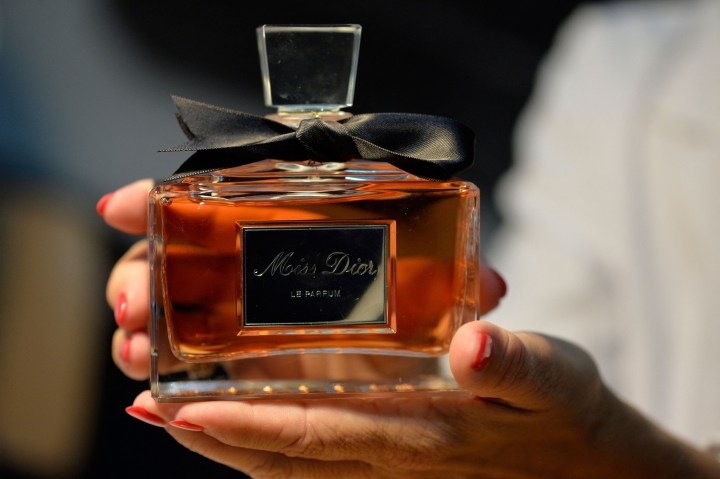
Why are perfume commercials so weird?

This is just one of the stories from our “I’ve Always Wondered” series, where we tackle all of your questions about the world of business, no matter how big or small. Ever wondered if recycling is worth it? Or how store brands stack up against name brands? Check out more from the series here.
Listener and reader Marissa Bialecki from Charlotte, North Carolina, asks:
It’s the holidays so there are a lot of fragrance ads on TV. Why are all (or nearly all) perfume and cologne ads provocative and just plain weird? What’s the history there? Have retailers found that actually generates more sales?
Only in the surreal world conjured up by fragrance companies can you find Natalie Portman climbing into a helicopter in mid-air after fleeing her own wedding.
Zendaya deftly rides a horse through the streets of downtown Los Angeles. Emma Mackey, who starred in this year’s “Barbie,” runs up a hill with lions, completely unfazed as she “embraces the power within.”
As our listener Marissa pointed out, fragrance commercials can be “just plain weird” or “provocative,” common characteristics in commercials from Dior, Lancome, Burberry and other luxury brands.
Experts say there’s a reason these commercials are often surreal: Companies can’t convey a scent over your TV or computer screen, instead relying on imagination.
Perfume offers a fantasy and sells a lifestyle
In a clothing commercial, where you can see the apparel, the aesthetics are the point. In a skin care commercial, you can see the model or actress’ glowing visage. In a car commercial, you can watch the actor test-driving the product.
“Unlike utilitarian products that an ad can promote based on their effectiveness, perfume is a nonessential beauty product that is — unlike fashion and makeup — also invisible,” explained Barbara Herman, the author of “Scent and Subversion: Decoding a Century of Provocative Perfume.”
Herman said this means these ads have to do some “heavy lifting” to sell these products.
“One way to do that is to confuse, excite and create mystery. In other words, to be weird and intriguing and inducting you into a fantasy. If perfume offers anything, it’s fantasy,” said Herman, who’s also the founder and creative director of Eris Parfums, a luxury niche perfume brand based in New York.
Jeffrey Carr, a clinical professor of marketing and entrepreneurship at New York University’s Stern School of Business, pointed out that most people don’t like advertising, period.
He said they think it’s intrusive and believe companies are lying to them. So they’ll use a commercial break as an opportunity to do something else. Or if they’re watching on a computer, they’ll use an ad blocker.
Advertisers in general have the challenge of making people stop and look. With a fragrance, the challenge is compounded because you can’t smell it.
“As my wife describes it, all they ever do is sell sex. It’s the impossibly beautiful couple on the sailing yacht in the Mediterranean. It’s Charlize Theron — I think she’s pretty naked, actually — coming out of the gold pool,” Carr said. “They’re selling a lifestyle, and they’re also trying to cut through the noise.”
As for whether these commercials increase sales, Carr said one of the puzzles of advertising is that the only way to know what works is to stop advertising that way.
“No one’s willing to take that chance,” he said. “So can I trace media? Can I see how many likes there are? Can I see how many people refer to it? Can I do those things? Yeah, I can … but how directly you can attribute it to sales, top and bottom line, I think that’s a little more challenging.”
But he added that these companies are probably spending the kind of money they do on fragrance commercials because they believe they work. When Theron became the face of Dior’s J’adore perfume back in 2004, she initially signed a three-year deal worth between $3 million and $5 million, according to reports at the time.
Perfume has always been about provocation
There have been shifts in the history of fragrance advertising. Herman pointed out that before the 1950s, many ads sold the idea of “trapping” men through perfume.
But as the second wave of feminism kicked off, some perfume ads featured the brand’s idea of the “independent woman.” The fragrance Charlie, released in the early 1970s, “offered freedom for women — to traipse about town, to wear slacks, not to be tied down,” Herman recalled.
The jingle in TV spots for the fragrance, starring “Charlie’s Angels” actress Shelley Hack, featured the phrase “Kinda young, kinda now, Charlie. Kinda free, kinda wow, Charlie!”
Regardless of how companies adapted, perfume advertisements have consistently included sexual innuendo or the assurance that you’ll become more desirable by wearing it.
“Perfume ads have always promised to help you become more erotically enticing, more powerful, more glamorous, more mysterious, all through the lens of what that means for the era in which the ad was created,” Herman said.
The fact that you can’t tell what a scent is like might be a perfume ad’s greatest asset as well as its greatest liability. When something is an enigma, the fantasy can’t be broken.
There’s a lot happening in the world. Through it all, Marketplace is here for you.
You rely on Marketplace to break down the world’s events and tell you how it affects you in a fact-based, approachable way. We rely on your financial support to keep making that possible.
Your donation today powers the independent journalism that you rely on. For just $5/month, you can help sustain Marketplace so we can keep reporting on the things that matter to you.


















